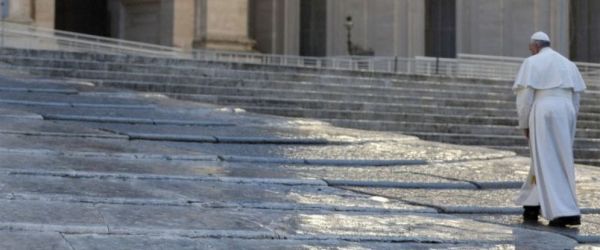Faith is "a gift" that one does not buy or acquire on one's own merits. Inspired by the liturgy of the day, Pope Francis, in the Mass celebrated on Friday 15 January at Santa Marta, continued to speak about the characteristics of faith.
Recalling how the previous day's Gospel had presented the episode of the leper who says to Jesus: "If you want, you can heal me", the Pontiff dwelt on the figures of others who are "resolute", others who are "courageous" driven by faith. Taking up the passage from Mark (2:1-12), Francis retraced the episode of the paralytic brought by his friends before Jesus. Who, "as usual, is among people, many people". In order to bring the sick man to him, the friends dared everything, 'but they did not think of the risks' involved in 'putting the stretcher on the terrace' or even the risk 'that the owner of the house would call the police and send them to jail'. They, in fact, 'thought only of approaching Jesus. They had faith'.
This is, the Pope said, the "same faith as that lady who also, in the midst of the crowd, when Jesus went to Jairus's house, reached out to touch the flap of Jesus's robe, of Jesus's mantle, to be healed". The same faith of the 'centurion who said: "No, no, master, do not trouble yourself: only one word from you, and my servant will be healed". A faith 'strong, courageous, going forward', with an 'open heart'.
At this point, however, Francis stressed, "Jesus takes a step forward". To explain what he said, the Pontiff recalled another Gospel episode, the one in which Jesus "in Nazareth, at the beginning of his ministry, had gone to the synagogue and said that he had been sent to free the oppressed, the imprisoned, give sight to the blind... inaugurate a year of grace, that is, a year - one can understand well - of forgiveness, of drawing closer to the Lord". He was pointing, that is, to a new road, 'a road to God'. The same thing happens with the paralytic to whom he does not simply say: 'Be healed', but: 'Your sins are forgiven'.
With this novelty, the Pope pointed out, Jesus triggered the reaction of "those whose hearts were closed". They 'already accepted - up to a certain point - that Jesus was a healer'; but that he also forgave sins was 'too much' for them. They thought: 'You have no right to say that, because only God can forgive sins'.
Then Jesus retorts: "Why do you think these things? So that you may know that the Son of Man has the power - and here, Francis explained, is "the breakthrough" - to forgive sins. Arise, take and heal". Jesus begins to speak the language 'that at a certain point will discourage people', a harsh language, with which he 'speaks of eating his body as the way to salvation'. He begins, that is, to "reveal himself as God", which he will later do clearly before the high priest by saying: "I am the Son of God".
A step forward that is also proposed to the faith of Christians. Each one of us, in fact, can have faith in "Christ the Son of God, sent by the Father to save us: yes, save us from sickness, so many good things that the Lord has done and helps us to do"; but above all we must have faith that he came to "save us from our sins, save us and bring us to the Father". This, Pope Francis said, is "the most difficult point to understand". And not only for the scribes "who said: 'But, this blasphemes! Only God can forgive sins!"". Some disciples, in fact, "doubt and leave" when Jesus shows himself "with a mission greater than that of a man, to give that forgiveness, to give life, to recreate humanity". So much so that Jesus himself "must ask his small group: 'Do you also want to leave?'".
From Jesus' question, the Pontiff took the cue to invite everyone to ask themselves: "What is my faith in Jesus Christ like? Do I believe that Jesus Christ is God, is the Son of God? And does this faith change my life? May it be renewed in my heart in this year of grace, this year of forgiveness, this year of drawing near to the Lord?"
It is an invitation to discover the quality of faith, aware that it "is a gift. No one 'deserves' faith. No one can buy it". For Francis, it is necessary to ask: "Does "my" faith in Jesus Christ, lead me to humiliation? I do not say to humility: to humiliation, to repentance, to prayer that asks: 'Forgive me, Lord' and that is able to testify: 'You are God. You 'can' forgive my sins'".
Hence the concluding prayer: "May the Lord make us grow in faith" so that we may do as those who, having heard Jesus and seen his works, "marvelled and praised God". Indeed, 'praise is the proof that I believe that Jesus Christ is God in my life, that he was sent to me to "forgive me"'. And praise, the Pontiff added, "is free. It is a feeling that gives the Holy Spirit and leads you to say: 'You are the only God'".
[Pope Francis, s. Marta, in L'Osservatore Romano 16/01/2016]












